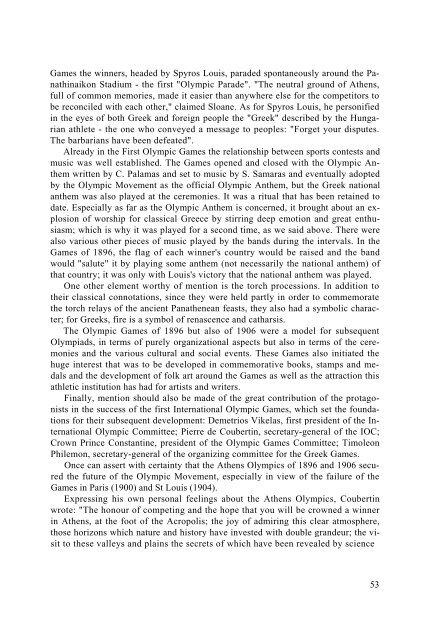You also want an ePaper? Increase the reach of your titles
YUMPU automatically turns print PDFs into web optimized ePapers that Google loves.
Games the winners, headed by Spyros Louis, paraded spontaneously around the Panathinaikon<br />
Stadium - the first "Olympic Parade". "The neutral ground of Athens,<br />
full of common memories, made it easier than anywhere else for the competitors to<br />
be reconciled with each other," claimed Sloane. As for Spyros Louis, he personified<br />
in the eyes of both Greek and foreign people the "Greek" described by the Hungarian<br />
athlete - the one who conveyed a message to peoples: "Forget your disputes.<br />
The barbarians have been defeated".<br />
Already in the First Olympic Games the relationship between sports contests and<br />
music was well established. The Games opened and closed with the Olympic Anthem<br />
written by C. Palamas and set to music by S. Samaras and eventually adopted<br />
by the Olympic Movement as the official Olympic Anthem, but the Greek national<br />
anthem was also played at the ceremonies. It was a ritual that has been retained to<br />
date. Especially as far as the Olympic Anthem is concerned, it brought about an explosion<br />
of worship for classical Greece by stirring deep emotion and great enthusiasm;<br />
which is why it was played for a second time, as we said above. There were<br />
also various other pieces of music played by the bands during the intervals. In the<br />
Games of 1896, the flag of each winner's country would be raised and the band<br />
would "salute" it by playing some anthem (not necessarily the national anthem) of<br />
that country; it was only with Louis's victory that the national anthem was played.<br />
One other element worthy of mention is the torch processions. In addition to<br />
their classical connotations, since they were held partly in order to commemorate<br />
the torch relays of the ancient Panathenean feasts, they also had a symbolic character;<br />
for Greeks, fire is a symbol of renascence and catharsis.<br />
The Olympic Games of 1896 but also of 1906 were a model for subsequent<br />
Olympiads, in terms of purely organizational aspects but also in terms of the ceremonies<br />
and the various cultural and social events. These Games also initiated the<br />
huge interest that was to be developed in commemorative books, stamps and medals<br />
and the development of folk art around the Games as well as the attraction this<br />
athletic institution has had for artists and writers.<br />
Finally, mention should also be made of the great contribution of the protagonists<br />
in the success of the first International Olympic Games, which set the foundations<br />
for their subsequent development: Demetrios Vikelas, first president of the International<br />
Olympic Committee; Pierre de Coubertin, secretary-general of the IOC;<br />
Crown Prince Constantine, president of the Olympic Games Committee; Timoleon<br />
Philemon, secretary-general of the organizing committee for the Greek Games.<br />
Once can assert with certainty that the Athens Olympics of 1896 and 1906 secured<br />
the future of the Olympic Movement, especially in view of the failure of the<br />
Games in Paris (1900) and St Louis (1904).<br />
Expressing his own personal feelings about the Athens Olympics, Coubertin<br />
wrote: "The honour of competing and the hope that you will be crowned a winner<br />
in Athens, at the foot of the Acropolis; the joy of admiring this clear atmosphere,<br />
those horizons which nature and history have invested with double grandeur; the visit<br />
to these valleys and plains the secrets of which have been revealed by science<br />
53

















